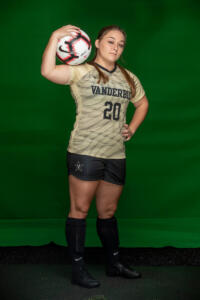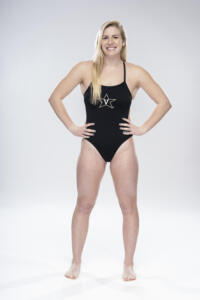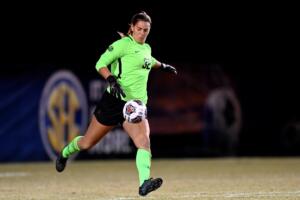Kaley Buchanan, BS’21, didn’t hesitate when Rebecca Rossett, BS’21, approached her last fall with the idea that grew into UniquelyMe, a self-styled movement to encourage discussion of issues related to body image among female athletes. Entering their final year as Vanderbilt student-athletes—Buchanan, a swimmer, and Rossett, a soccer player—the friends often had long, raw conversations about shared life experiences. Surely, they reasoned, other female athletes could benefit from a community that encourages those types of conversations.
Buchanan, Rossett and Sarah Fuller, BA’21, a mutual friend and soccer student-athlete who became UniquelyMe’s third co-founder, hope that the result endures as they move beyond their playing days at Vanderbilt.
Theirs is a world in which women continue to knock down barriers to athletic participation, including Fuller’s history-making SEC football debut last fall. Through UniquelyMe, which invites women to submit blog posts about their experiences with body image, Buchanan, Rossett and Fuller hope to ensure that the next generation of female athletes has the opportunity not only to compete but to be comfortable as themselves.

Growing up in the women’s soccer hotbed of New Jersey, which produced World Cup winners like Tobin Heath, Carli Lloyd and Heather O’Reilly, Rossett had plenty of role models for how to play the game. But though she could pattern her skills on those women, she couldn’t do anything to look more like them or like representations of females she saw in mass media.
“There is this mold of what an athlete should look like,” Rossett said. “I always had this vision of what I saw in the media and what everyone thought an athlete should look like. And then I’m just the complete opposite. I was always just this 5-foot little girl who had a bunch of muscle running around the field.
“I’m like, ‘Wait, why doesn’t anyone look like me?’”
Even as she progressed and thrived, scoring more than 100 goals in high school, the contrast wore at her self-confidence. She found a home at Vanderbilt, but she couldn’t shake the feeling that others judged her size rather than her skill, production and passion on the field. Even when supposedly well-meaning, the jokes about her build burrowed into the back of her mind.
“A lot of athletes put the pressure on themselves to fit that mold and be the perfect weight or look a certain way,” Rossett said. “So many people think that they might be giving a compliment while not understanding what each individual goes through in their own mind. It might be a trigger for something they’re very self-conscious about.”
At the heart of UniquelyMe is the idea that such experiences are widespread, if not universal, and they are potentially isolating if left to fester. Even for the naturally outgoing Buchanan, who volunteered to write the site’s first blog post, pulling the curtain back was uncomfortable.
Buchanan trained to compete. She honed her body and technique to show the world the strongest version of herself each time she dove in the pool. She didn’t train to put her vulnerabilities on display. Yet there they were on the screen as she wrote. And rewrote. And agonized: Do I really want people to read this? Is this really how I want this story portrayed?
Delete a sentence. Delete a paragraph. Try again. It had to be right. But somewhere along the creative path, she was no longer certain if she was still perfecting or merely stalling. The site was ready to launch, and it just needed a story to tell. She hit Publish.
“I thought if we were asking other people to be vulnerable with us,” Buchanan concluded, “then I needed to be vulnerable.”

A gymnast as a young girl, Buchanan switched to competitive swimming as she entered her teenage years. In her blog post, she detailed the challenges that accompanied her new passion.
“Rather than being celebrated for my speed, I began getting made fun of for being able to keep up with the boys at practice. I started receiving comments on my body, being ‘too muscular’ for a female. At the time, I was aware of the comments, but I brushed them off. Soon it wasn’t just my teammates. Family friends and parents of other swimmers would comment on how muscular I was compared to others my age. I felt myself shrink as friends and siblings would ‘joke’ about my strength and appearance. I quickly noticed myself checking my body every time I passed a mirror, slipping into the dangerous mindset of comparison.”
Building UniquelyMe from the spark of an idea into the words Buchanan published began when she and Rossett served last year on Vanderbilt’s Student-Athlete Advisory Committee. Members were encouraged to submit “passion proposals,” and Rossett went to Buchanan with the inspiration of turning their conversations into something more substantive.
After spitballing ideas with Buchanan and Fuller, who expressed interest in helping as soon as she heard about the idea, they settled on written blog posts as a technologically convenient method to empower the voices sharing stories and to build a community of readers.
“I’m a big reader, and I enjoy getting perspectives from other people,” Rossett said. “I love learning what makes each person unique and what struggles they went through.”
The realities of busy fall seasons and academic demands briefly paused plans in the development phase. But after finalizing plans and receiving university encouragement for the project late in the fall semester, they brought the plans to life after the winter holidays. With an interest in graphic design, Fuller took the lead role in developing the website. Buchanan published the initial post on March 3, eventually working up the nerve to share it on Facebook and reach a wider audience.
Subsequent submissions came from fellow Vanderbilt student-athletes and friends from other schools. A former swimmer from the University of Delaware wrote about the challenges with body image she encountered after leaving the sport. Mary Glenn Lipman, assistant director of sports nutrition at Vanderbilt, wrote about the personal experiences that led her to pursue a career as a dietician. UniquelyMe reached a milestone of sorts in early April with their first post from someone they didn’t know at all beyond the site, a high school rugby athlete.
“You want to help people, and you want to feel like you’re making a difference,” Rossett said. “But to actually do it and see people appreciating it and feeding into it, it just felt really good.”

The next challenge is building the project beyond Vanderbilt. All three founders moved on this spring—Fuller to graduate school at University of North Texas, Rossett to graduate school at Drexel University and Buchanan to a job in health care. With the pandemic receding, one hope is to eventually add an in-person component, perhaps a presentation they or other ambassadors could make to schools or youth teams. Beyond that, it’s still a work in progress.
“I’m not sure what it’s going to turn into now,” Buchanan said. “I just hope people want to continue to share their stories and want to be open and honest with this community we’re trying to create.”
Like Buchanan, who is coaching swimming this summer, Rossett hasn’t strayed far from sports. Initially talked into coaching a cousin’s under-8 soccer team, she’s now helping with a U-13 team and will be an assistant coach at Woodbury High School in New Jersey, the school she attended.
She talks to the girls she coaches about positive body image. In some ways, it’s easier now. From Serena Williams to World Cup winner Lindsey Horan, high-profile female athletes use their platform to talk about all the ways body image can affect athletes. But with the ever-increasing proliferation of social media, Rossett also worries that each generation feels more pressure to conform to what popular culture, media or peers suggest is the ideal body image.
She encourages them to love themselves and be comfortable in their own skin. It’s why she, too, is working on a blog post for the site.
“Being open and vulnerable and addressing those struggles is hard,” Rossett said. “It’s hard to relive and look back at what you’ve been through. It’s more challenging than I thought it would be. It’s a lot of writing, deleting, rewriting.”
All in hopes that the community they are building will make it much easier for their successors.



